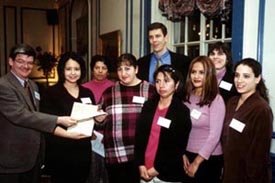 Telpochcalli Community Arts Elementary School
Telpochcalli Community Arts Elementary SchoolI feel like a fish out of water here in Chicago as a San Francisco school board member trying to stay warm while learning about the huge scale of Chicago social movements and the current big business generated 'reforms' at the City level. At the National School Boards Assn/Council of Urban Boards of Education conference here yesterday we heard a panel on how urban school districts are dealing with massive school closings. In San Francisco we have closed 8 schools and merged or moved a bunch more since last year in order to deal with declining enrollments for the past 5 years. There are probably more to come as our district [with communities and City partners] struggles to reverse the loss of 800-1000 students per year in our now 57,000 student district.
But Chicago and Detroit and other urban districts seem to be going through what Education Week calls a 'death spiral' as they are losing students at an even faster rate and on a much larger level than San Francisco or Seattle.
The ppt presentation from David Pickens, a young exec from Chicago Public Schools representing CPS CEO Arne Duncan, was chock full of numbers and policies and guidelines on how Renaissance 2010 [REN 10] and their school closings process is working. But my talks with community activists here give a much different story.
Susan Ohanian posted a recent Phi Delta Kappan analysis by Bill Ayers and Mike Klonsky of what's really going on in Chicago's schools.
Chicago’s School Reform: Chicago’s Renaissance 2010: The Small Schools Movement Meets the Ownership Society
Ohanian highlights the contradictory impact of school reform driven by big business and elites, as opposed to parents, students, teachers and our communities:
School reform becomes part of what the authors call the “ownership society,” which cannibalizes everything from education to health care to retirement benefits, criminal justice, waste management, elections, public safety, and water rights. Any area that has traditionally been part of the common good and publicly administered is now up for grabs, and public schools are no exception.The Smalls Schools Workshop which Klonsky, Ayers and others founded in 1991 just celebrated their 15th reunion last weekend. The article summed up some of the important lessons from the struggle for small schools and a more democratic education system.
Public space is being divided into sectors to be sold off or privately managed.
Klonsky gives regular updates on the impact of Ren 10 on his blog Small TalkSmall schools are not a panacea, and, while they create wonderful possibilities, the language of small schools can be twisted to become an excuse for inequity and promotion of the ownership culture. Every wave of official “school reform,” including small schools and Ren 10, must be met with skepticism, agnosticism, and doubt by those of us who hope and struggle for a more democratic future, a more just social order.
A school renaissance built on the ideals of the ownership society, on privilege for a few, on creating winners and losers among students and among neighborhoods will never sustain itself. On the other hand, small schools and classrooms built on equality and community, on shared power, on the right to humane treatment, on full participation, and on access can flourish and nourish a community.
more on the small schools workshop and Sue and Mike Klonsky
more on Bill Ayers UIC/ Small Schools Movement
more on Susan Ohanian

No comments:
Post a Comment